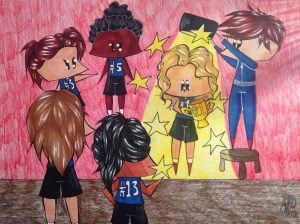By Alli Gray

In a world where team sports have no flaws, players are taught cooperation, and coaches treat each player fairly with equal devotion and support. As most athletes know, that’s not always the case. Favoritism has corrupted sports from elementary level to professional leagues since athletic competition came to exist.
A coach’s job is to mentor the athlete and teach them skills including leadership, confidence, and respect, while giving equal opportunity to all players. Yet, in a world filled with politics in sports, most coaches prefer to gravitate toward a few athletes they favor more than others. Usually, the athletes who have played for the club team or the coach the longest are showed the most favoritism. Coaches tend to choose familiar faces to get the job done without even considering the skills the new athletes may bring to the table. They should put faith in all their athletes equally and give each and every one of them a chance to shine.
Players, along with parents, will do whatever it takes to seek their coach’s attention. Whether it’s buying gifts, giving compliments, or helping out the coach, athletes tend to focus more on the game of who can be coach’s favorite rather than playing the other team. This can easily ruin the athletes’ bonds with each other. It creates conflict and tension between them causing their attention to turn towards something besides the game. What athletes should be focused on is being a team player and overall performance rather than worrying about how the coach personally feels about them.
Favoritism confuses other players and makes them second guess if they’re good enough to play the sport which can cause stress and pressure. Players who are not given support and encouragement limit how hard they try and have less of a motive to achieve anything. In some cases, athletes may quit the sport after a bad experience with the coach. This can cause long term effects, such as low self esteem and self confidence issues.
Whether it be a coach who plays favorites or a teammate who kisses up, athletes should not have to go through the fear of rejection and stress while playing on a team. They should gain confidence in themselves, work together with their teammates, and learn how to be leaders. Although tough situations inevitably come with being on a team, coaches shouldn’t be so destructive in what they say and do to stop them from playing the sport they love.











